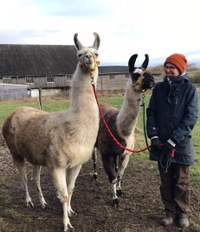Dr. Désirée Brucks
desiree.brucks@agrar.uni-giessen.de
Telefon: +49 641 99 37647
OCRID: 0000-0003-3146-5110
Research Gate: https://www.researchgate.net/profile/Desiree_Brucks
Curriculum Vitae
| Seit 2020 |
PostDoc, Abteilung Tierhaltung und Haltungsbiologie, Institut für Tierzucht und Haustiergenetik, Justus-Liebig-Universität Gießen, Deutschland |
| 2019-2020 | PostDoc, Institut für Agrarwissenschaften, ETH Zürich, Schweiz |
| 2018-2019 |
PostDoc, Gruppe für Vergleichende Kognitionsforschung, Max-Planck-Institut für Ornithologie, Seewiesen, Deutschland |
| 2013-2017 |
Ph.D. Vergleichende Kognitionsforschung, Messerli Research Institut, Veterinärmedizinische Universität Wien, Österreich |
| 2010-2012 |
M.Sc. Verhaltensbiologie, Georg-August-Universität Göttingen, Deutschland |
| 2007-2010 | B.Sc. Biologie, Georg-August-Universität Göttingen, Deutschland |
Forschungsinteressen
- Vergleichende Kognitionsforschung bei domestizierten und wilden Arten
- Kognition von Nutztieren (insbesondere Schweine und Kameliden)
- Soziale Kognition und Mensch-Tier Interaktionen
- Tierwohl
Publikationen
- Brucks D, Essler JL, Marshall-Pescini S & Range F. (2016). Inequity aversion negatively affects tolerance and contact-seeking behaviours towards partner and experimenter. PLoS One 11(4): e0153799.
- Brucks D, Marshall-Pescini S, Essler JL, McGetrick J, Huber L & Range F. (2017) What are the ingredients for an inequity paradigm? Manipulating the experimenter’s involvement in an inequity task with dogs. Frontiers in Psychology, 8, 270.
- Brucks D, Soliani M, Range F & Marshall-Pescini S. (2017). Reward type and behavioural patterns predict dogs’ success in a delay of gratification task. Scientific Reports, 7, 42459.
- Brucks D, Marshall-Pescini S, Wallis L, Huber L & Range F. (2017). Measures of dogs’ inhibitory control abilities do not correlate across tasks. Frontiers in Psychology, 8, 849.
- Brucks D, Marshall-Pescini S & Range F. (2017) Dogs’ reaction to inequity is affected by inhibitory control. Scientific Reports, 7, 15802.
- Brucks D, Marshall-Pescini S & Range F. (2018) Dogs and wolves do not differ in their inhibitory control abilities in a non-social test battery. Animal Cognition, 22, 1-15.
- Tassin de Montaigu C, Durdevic K, Brucks D, Krasheninnikova A & von Bayern A. (2019) Blue-throated macaws (Ara glaucogularis) succeed in a cooperative task despite coordinating their actions. Ethology, 126, 267-277.
- Krasheninnikova A, Brucks D, Blanc S & von Bayern A. (2019) Assessing African grey parrots’ prosocial tendencies in a token choice paradigm. Royal Society Open Science, 6, 190696.
- Krasheninnikova A, Brucks D, Buffenoir N, Rivas Blanco D, Soulet D & von Bayern A. (2019) Parrots do not show inequity aversion in a modified token exchange paradigm. Scientific Reports, 9, 16416.
- Brucks D & von Bayern A. (2020) Parrots voluntarily help each other to obtain food rewards. Current Biology, 30, 292-297.
- Range F, Brucks D & Virányi Z. (2020) Dogs wait longer for better rewards than wolves in a delay of gratification task: but why? Animal Cognition, 23, 443-453.
- McGetrick J, Brucks D, Marshall-Pescini S & Range F. (2020) No evidence for a relationship between breed cooperativeness and inequity aversion in dogs. PLoS One, 15 (6), e0233067.
- Brucks D, Petelle M, Baldoni C, Krasheninnikova A, Rovegno, E, & von Bayern AMP. (2021) Intra-and interspecific variation in self-control capacities of parrots in a delay of gratification task. Animal Cognition, 25(2):473–491.
- Brucks D, Drews B & Ulbrich S. (2022) Exploring the social network of captive roe deer (Capreolus capreolus). Applied Animal Behaviour Science, 246: 105526.
- Brucks D, Härterich A, & König von Borstel U. (2022) Horses wait for better and more rewards in a delay of gratification test. Frontiers in Psychology, 13:954472.
